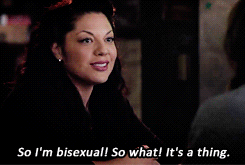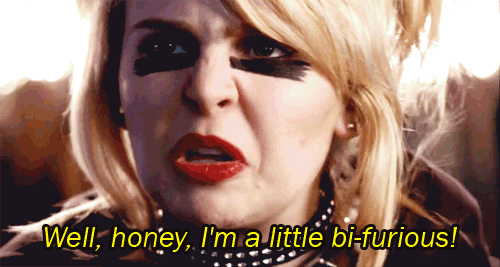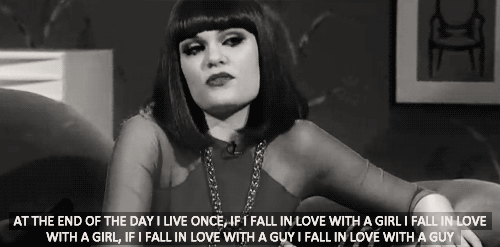While it’s wonderful that we’re seeing more and more Hollywood stars coming out as bisexual (or refusing to label their sexuality entirely), that doesn’t erase the discrimination that many bisexual people still face. While it can be comforting to queer people to hear stars like Amandla Stenberg and Aubrey Plaza say they date all genders, that still might not help them when they’re dealing with their confused boyfriends/girlfriends or disapproving parents. To get a better glimpse into the discrimination that bisexual women are still facing, I spoke with five of my female friends who identify as bisexual to find out how people around them treat them differently just because they’re bi.

Sarah, 37
“I went on a date with an English guy and once he found out I was bisexual he said, “Is it true what they say about bisexuals? That they’re, you know, insatiable? I have a friend who’s bisexual and she’s craaaazy. First she dates a man and then she dates a woman.” I told him, “Yeah, that sounds like a bisexual.” He just didn’t get it. I also had a friend who said he would caution his son not to date a bisexual because it was “too risky.” Yeah, because straight/gay people never hurt each other.”
Sam, 26
“In middle school I’d broken up with a girl who was generally considered to be among our class’s hottest. We were walking back to her place after school when she informed me that her aunt (a “lesbian”) had been telling her niece that it was OK to be bisexual. “Isn’t that fucked up?” she said, in that valley-girl way that I have no idea how she cultivated. I said, no and that it was in fact pretty fucked up to be homophobic (and in retrospect, biphobic) in that regard, and dumped her. Cue four years of presumed gayness on my part after we broke up due to her homophobia and people assumed I must have been gay.”
Sylvie, 25
“In my experience, being openly bisexual can actually be harder in queer communities than straight ones. Sure, straight people are mostly responsible for a lot of terrible and annoying stereotypes about bi women, but when you meet those people, it’s pretty easy to laugh in their faces and then never talk to them again. In queer spaces, it’s tougher. No matter how many girls you’ve slept with/dated/been in love with, most gay women will question if you’re “actually into girls,” either to your face or behind your back. I’m totally fine with teasing because I’m not a very serious person in general, but it really hurts when conversations take a more serious tone and you start to feel unaccepted. It especially sucks if you start dating a guy because that can really distance yourself from certain aspects of the LGBTQ community, in both explicit and implicit ways. Like, nobody will kick you out of a gay bar, but you’re not going to have a great time bringing your boyfriend to the Cubby Hole for Margarita Tuesdays. That being said, who wants to hang out with some girl’s boyfriend at a gay bar? So as much as that aspect sucks, I also kind of get that one.”
Caroline, 24
“Most of my friends, my mom, and my partners know I’m bisexual, but because I mainly wind up in relationships with men, I’ve noticed that many of them refer to me as someone who “used to be bisexual” or they treat it like it was just a quirky phase I had when I was younger. It’s difficult to get people to see that the heterosexual relationships I’m currently in don’t negate the validity and meaning of my queer experience.”
Eliza, 24
“When I came out in high school to to one person the whole school knew within a day. There were girls in my gym class who felt uncomfortable with me dressing in the same locker room, so I was forced to use the middle school dressing room by myself. I had “friends” who, when they found out I also liked girls, never spoke to me again. They acted as if I was poisoned or may harm them. It was very hurtful and I wondered for a long time what was wrong with me. When I joined the workforce and became closer to my co-workers my sexuality was discussed. When I felt comfortable enough to disclose that I was bisexual, I was met with nasty faces and harsh words like, “Oh so you’re a carpet muncher?” Some of the girls acted as if my bisexuality meant that anything I said was my way of hitting on them.”
Original by Lane Moore


